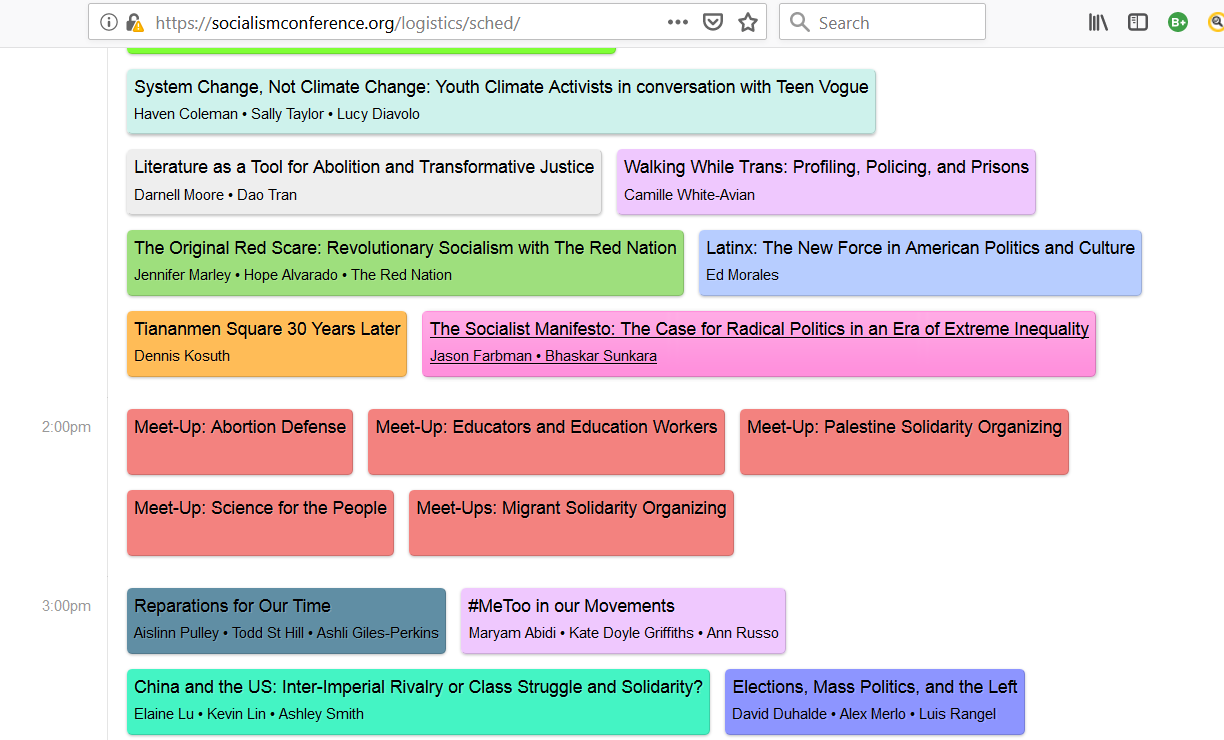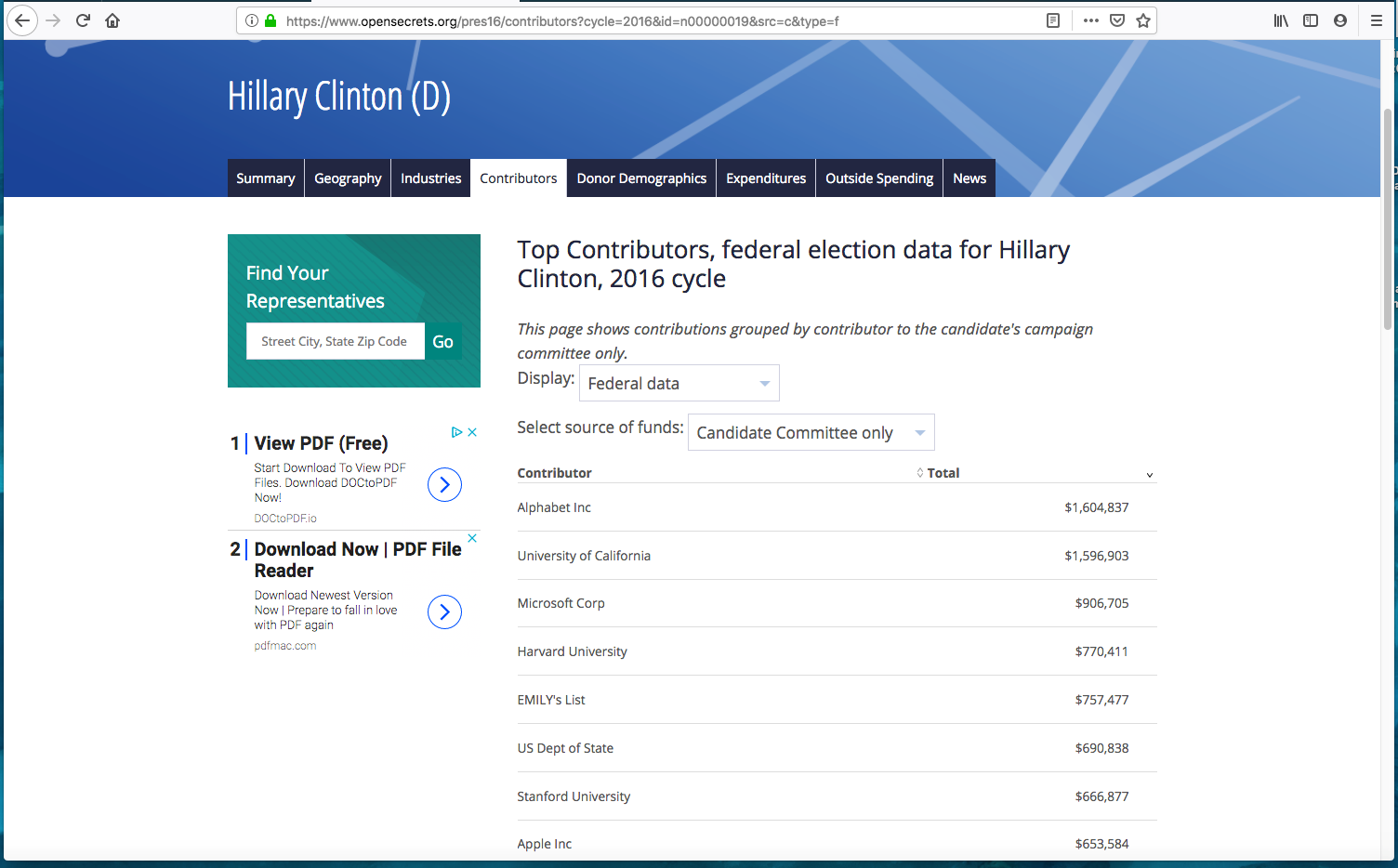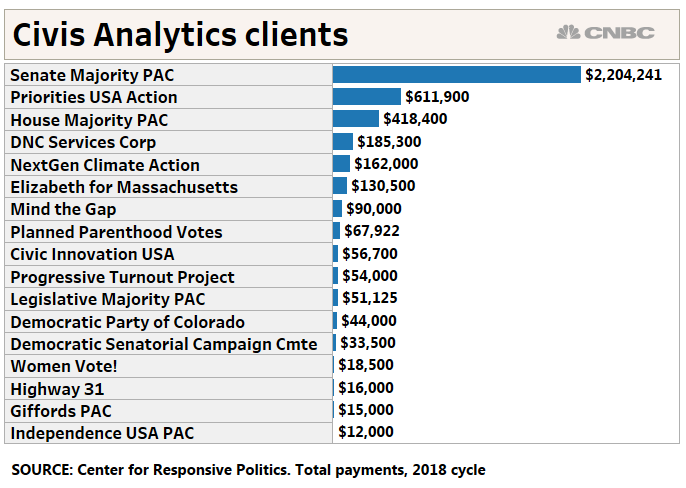Primer: One of the breakout sessions was titled ‘Can we Organize Amazon’. Could it be that this was part of the Amazon walkout crowd too?
Consider a few of these other breakout sessions. Just a sample day.

So……While you were enjoying your Fourth of July weekend, I was attending a national conference on socialism, Jarrett Stepman that is…..
Why? Because socialism is having its moment on the left.
Since there’s often confusion as to what socialism really is, I decided to attend the Socialism 2019 conference at the Hyatt Hotel in Chicago over the Fourth of July weekend.
The conference, which had the tag line “No Borders, No Bosses, No Binaries,” contained a cross-section of the most pertinent hard-left thought in America. Among the sponsors were the Democratic Socialists of America and Jacobin, a quarterly socialist magazine.
The walls of the various conference rooms were adorned with posters of Karl Marx and various depictions of socialist thinkers and causes.
Most of the conference attendees appeared to be white, but identity politics were a major theme throughout—especially in regard to gender.
At the registration desk, attendees were given the option of attaching a “preferred pronoun” sticker on their name tags.
In addition, the multiple-occupancy men’s and women’s restrooms were relabeled as “gender neutral,” and men and women were using both. Interestingly enough, the signs above the doors were still labeled with the traditional “men’s” and “women’s” signs until they were covered over with home-made labels.
One of the paper labels read: “This bathroom has been liberated from the gender binary!”
While the panelists and attendees were certainly radical, and often expressed contempt for the Democratic Party establishment, it was nevertheless clear how seamlessly they blended traditional Marxist thought with the agenda of what’s becoming the mainstream left.
They did so by weaving their views with the identity politics that now dominate on college campuses and in the media and popular entertainment. The culture war is being used as a launching point for genuinely socialist ideas, many of which are re-emerging in the 21st century.
Here are six takeaways from the conference:
1. Serious About Socialism
A common line from those on the modern left is that they embrace “democratic socialism,” rather than the brutal, totalitarian socialism of the former Soviet Union or modern North Korea and Venezuela. Sweden is usually cited as their guide for what it means in practice, though the reality is that these best-case situations show the limits of socialism, not its success.
It’s odd, too, for those who insist that “diversity is our strength” to point to the culturally homogenous Nordic countries as ideal models anyway.
It’s clear, however, that while many socialists insist that their ideas don’t align with or condone authoritarian societies, their actual ideology—certainly that of those speaking at the conference—is in no sense distinct.
Of the panels I attended, all featured speakers who made paeans to traditional communist theories quoted Marx, and bought into the ideology that formed the basis of those regimes.
Mainstream politicians may dance around the meaning of the word “socialist,” but the intellectuals and activists who attended Socialism 2019 could have few doubts about the fact that Marxism formed the core of their beliefs.
Some sought to dodge the issue. One was David Duhalde, the former political director of Our Revolution, an activist group that supports Sen. Bernie Sanders, I-Vt., and that was an offshoot of Sanders’ 2016 presidential campaign.
Duhalde said that Sanders is a creation of the socialist movement—having had direct ties to the Socialist Party of America in his youth—but hasn’t maintained an official connection to socialist political organizations throughout his political career.
Sanders’ position, according to Duhalde, is “anti-totalitarian” and that he favors a model based on “neither Moscow, nor the United States, at least in this formation.”
It’s a convenient way of condemning capitalist-oriented societies while avoiding connections to obviously tyrannical ones.
It was also difficult to mistake the sea of red shirts and posters of Marx that adorned the walls at the conference—or the occasional use of the word “comrades”—as anything other than an embrace of genuine socialism, but with a uniquely modern twist.
2. Gender and Identity Politics Are Ascendant
Transgenderism, gender nonconformity, and abolishing traditional family structures were huge issues at Socialism 2019.
One panel, “Social Reproduction Theory and Gender Liberation,” addressed how the traditional family structure reinforced capitalism and contended that the answer was to simply abolish families.
Corrie Westing, a self-described “queer socialist feminist activist based in Chicago working as a home-birth midwife,” argued that traditional family structures propped up oppression and that the modern transgender movement plays a critical part in achieving true “reproductive justice.”
Society is in a moment of “tremendous political crisis,” one that “really demands a Marxism that’s up to the par of explaining why our socialist project is leading to ending oppression,” she said, “and we need a Marxism that can win generations of folks that can be radicalized by this moment.”
That has broad implications for feminism, according to Westing, who said that it’s important to fight for transgender rights as essential to the whole feminist project—seemingly in a direct shot at transgender-exclusionary radical feminists, who at a Heritage Foundation event in January argued that sex is biological, not a societal construct, and that transgenderism is at odds with a genuine feminism.
She contended that economics is the basis of what she called “heteronormativity.”
Pregnancy becomes a tool of oppression, she said, as women who get pregnant and then engage in child rearing are taken out of the workforce at prime productive ages and then are taken care of by an economic provider.
Thus, the gender binary is reinforced, Westing said.
She insisted that the answer to such problems is to “abolish the family.” The way to get to that point, she said, is by “getting rid of capitalism” and reorganizing society around what she called “queer social reproduction.”
“When we’re talking about revolution, we’re really connecting the issues of gender justice as integral to economic and social justice,” Westing said.
She then quoted a writer, Sophie Lewis, who in a new book, “Full Surrogacy Now: Feminism Against Family,” embraced “open-sourced, fully collaborative gestation.”
3. Open Borders Is Becoming a Litmus Test
It’s perhaps not surprising that socialists embrace open borders. After all, that’s becoming a much more mainstream position on the left in general.
The AFL-CIO used to support immigration restrictions until it flipped in 2000 and called for illegal immigrants to be granted citizenship.
As recently as 2015, Sanders rejected the idea of open borders as a ploy to impoverish Americans.
But Justin Akers-Chacon, a socialist activist, argued on a panel, “A Socialist Case for Open Borders,” that open borders are not only a socialist idea, but vital to the movement.
Akers-Chacon said that while capital has moved freely between the United States and Central and South America, labor has been contained and restricted.
He said that while working-class people have difficulty moving across borders, high-skilled labor and “the 1%” are able to move freely to other countries.
South of the border, especially in Mexico and Honduras, Akers-Chacon said, there’s a stronger “class-consciousness, as part of cultural and historical memory exists in the working class.”
“My experiences in Mexico and my experiences working with immigrant workers, and my experiences with people from different parts of this region, socialist politics are much more deeply rooted,” he said.
That has implications for the labor movement.
Despite past attempts to exclude immigrants, Akers-Chacon said, it’s important for organized labor to embrace them. He didn’t distinguish between legal and illegal immigrants.
For instance, he said one of the biggest benefits of the Immigration Reform and Control Act of 1986 was that there was a brief boost in union membership amid a more general decline in unionism.
Besides simply boosting unions, the influx “changed the whole AFL-CIO position on immigrants, [which was] still backwards, restrictive, anti-immigrant,” Akers-Chacon said.
“So, there’s a correlation between expanding rights for immigrants and the growth, and confidence, and militancy of the labor movement as a whole,” he said.
4. ‘Clickbait’ Communism Is Being Used to Propagandize Young Americans
The magazine Teen Vogue has come under fire recently for flattering profiles of Karl Marx and promoting prostitution as a career choice, among other controversial pieces.
It would be easy to write these articles off as mere “clickbait,” but it’s clear that the far-left nature of its editorials—and its attempt to reach young people with these views—is genuine.
Teen Vogue hosted a panel at Socialism 2019, “System Change, Not Climate Change: Youth Climate Activists in Conversation with Teen Vogue.”
The panel moderator was Lucy Diavolo, news and politics editor at the publication, who is transgender.
“I know there’s maybe a contradiction in inviting Teen Vogue to a socialism conference … especially because the youth spinoff brand is a magazine so associated with capitalist excess,” Diavolo said. “If you’re not familiar with our work, I encourage you to read Teen Vogue’s coverage of social justice issues, capitalism, revolutionary theory, and Karl Marx, or you can check out the right-wing op-eds that accuse me of ‘clickbait communism’ and teaching your daughters Marxism and revolution.”
The panel attendees responded enthusiastically.
“Suffice to say, the barbarians are beyond the gates. We are in the tower,” Diavolo boasted.
5. The Green Movement Is Red
It’s perhaps no surprise that an openly socialist member of Congress is pushing for the Green New Deal—which would essentially turn the U.S. into a command-and-control economy reminiscent of the Soviet Union.
Rep. Alexandria Ocasio-Cortez’s chief of staff Saikat Chakrabarti recently said, according to The Washington Post: “The interesting thing about the Green New Deal is it wasn’t originally a climate thing at all.”
“Do you guys think of it as a climate thing?” Chakrabarti asked Sam Ricketts, climate director for Washington Gov. Jay Inslee, who is running for president in the Democratic primary. “Because we really think of it as a how-do-you-change-the-entire-economy thing.”
Economic transformation barely disguised as a way to address environmental concerns appears to be the main point.
One of the speakers on the Teen Vogue climate panel, Sally Taylor, is a member of the Sunrise Movement, a youth-oriented environmental activist group that made headlines in February when several elementary school-age members of the group confronted Sen. Dianne Feinstein, D-Calif., about her lack of support for the Green New Deal.
The other speaker on the Teen Vogue climate panel was Haven Coleman, a 13-year-old environmental activist who has received favorable coverage for leading the U.S. Youth Climate Strike in March. She was open about the system change she was aiming for to address climate change.
She noted during her remarks that she was receiving cues from her mother, who she said was in attendance.
Haven said the answer to the climate change problem was moving on from our “capitalistic society” to something “other than capitalism.”
Interestingly, none of the glowing media profiles of Haven or the Climate Strike mentioned a link to socialism or abolishing capitalism.
6. Socialism Can’t Be Ignored as a Rising Ethos on the Left
According to a recent Gallup survey, 4 in 10 Americans have a positive view of socialism. Support among Democrats is even higher than among the general population, with a majority of Democrats saying they prefer socialism to capitalism.
But many who say they want socialism rather than capitalism struggle to define what those terms mean and change their views once asked about specific policies.
As another Gallup poll from 2018 indicated, many associate socialism with vague notions of “equality,” rather than as government control over the means of production in the economy.
What’s clear from my observations at Socialism 2019 is that traditional Marxists have successfully melded their ideology with the identity politics and culture war issues that animate modern liberalism—despite still being quite far from the beliefs of the average citizen.
Socialists at the conference focused more on social change, rather than electoral politics, but there were still many core public policy issues that animated them; notably, “Medicare for All” and government run-health care, some kind of Green New Deal to stop global warming (and more importantly, abolish capitalism), open borders to increase class consciousness and promote transnational solidarity, removing all restrictions on—and publicly funding—abortion, and breaking down social and legal distinctions between the sexes.
They were particularly able to weave their issues together through the thread of “oppressor versus oppressed” class conflict—for instance, supporting government-run health care meant also unquestioningly supporting unfettered abortion and transgender rights.
Though their analyses typically leaned more heavily on economic class struggle and determinism than what one would expect from more mainstream progressives, there wasn’t a wide gap between what was being discussed at Socialism 2019 and the ideas emerging from a growing segment of the American left.







 Where is some of these social justice policy concepts coming from that were introduced at both Democrat debates? Yet another project also tied to Civis Analytics call The New Progressive Agenda Project.
Where is some of these social justice policy concepts coming from that were introduced at both Democrat debates? Yet another project also tied to Civis Analytics call The New Progressive Agenda Project.